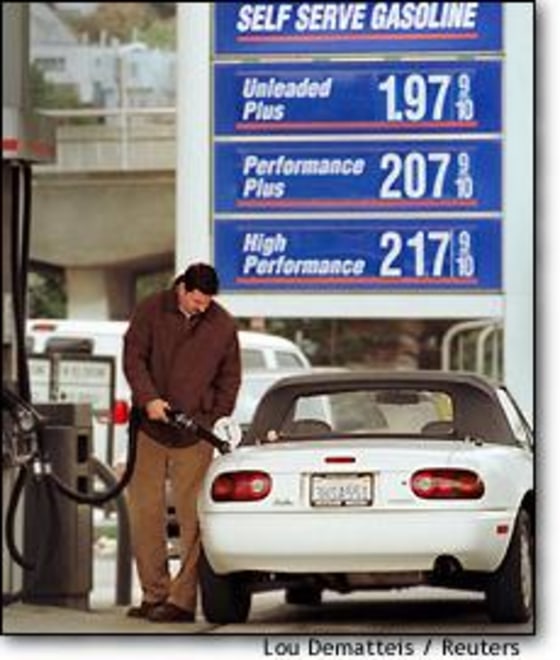Two dollars a gallon! What are we going to do? Put more pressure on OPEC, tap the Strategic Petroleum Reserve, scrap the gasoline tax, start drilling in Alaska — anything, but just get the price of gas down! Well, before we all get too hysterical, a little global perspective is needed.
There's no doubt the recent rise in gasoline prices is hurting many — low-income families face the daunting task of trying to find extra funds to pay for the escalating cost of filling up at the pump, and folks like truckers who are totally at the mercy of oil prices are facing an uphill ride.
And there’s also little doubt that the members of the Organization of Petroleum Exporting Countries could afford to pump a bit more oil without jeopardizing their economies.
“Homeowners are struggling to pay their heating oil bills, truckers are fighting to stay in business and motorists this spring may well be boiling over prices at the pump,” Senate Energy Committee Chairman Frank Murkowski said Wednesday after unveiling legislation to drill in Alaska’s Arctic National Wildlife Refuge.
Everything's relative
But before you pull up at your local gas station in your 12-miles-to-the gallon SUV and start whining about the cost of a fill up exceeding the limit on your credit card, consider the cost of cruising around the United Kingdom or Germany.
According to the Energy Information Administration, the average price of premium unleaded gasoline in the U.S. on Monday was $1.67. Sure, that’s up from $1.46 at the beginning of the year, and up from $1.11 a gallon a year ago.
But if you went to fill up say your BMW in Frankfurt, Germany on Monday, it would have cost you $3.63 a gallon. And if you had to fill up in England, it would have been $4.61 a gallon.
Much of the reason for those high prices overseas is that those governments tax gasoline much more aggressively than the U.S. government. But regardless of how much of the price is tax, $4.61 a gallon is $4.61 a gallon, and you’d likely need a second mortgage to get around London in your Ford Expedition (assuming the thing would actually fit through the streets.)
A gas out?
On today, some drivers — ticked off by OPEC’s stranglehold on oil prices — were calling for a “Gas Out,” suggesting we all don’t buy gas between April 7 and 9. “Come on North America, let’s stand together,” said one posting.
Is that really going to help? How about buying a vehicle that is just a little bit more economical than your average Sherman tank? If we all drove vehicles that would do 25 miles to the gallon, maybe we wouldn’t need to rely on foreign oil imports quite so much.
Dig up Alaska?
Meanwhile, Senate Energy Committee Chairman Murkowski is ready to start hauling rigs and nodding donkeys into the Alaskan wilderness to solve the crisis. He claims that drilling is less of an environmental risk than importing oil, because the latter entails supertankers and the possibility of oil spills.
And Chevrolet Suburbans at 14 miles per gallon around town are environmentally friendly?
Fortunately, President Clinton already vetoed a measure to allow oil development on the coastal plain back in 1995, and would likely do it again this time around.
But how about legislation that would require automakers to produce vehicles with a minimum efficiency of 20 miles to the gallon? Or tax breaks and incentives on alternatively powered cars?
And it's not just gas…
America’s love for the automobile is never going to die — too much of American society is organized around the car/minivan/SUV. And so it really boils down to simple economics — we have a strong demand for oil, OPEC has a vast supply of oil.
Sure, OPEC could pump oil like crazy and gasoline would drop to $1 a gallon, or even less. That’s all well and good, but one day the black stuff is going to run out, and then what are we (or more specifically, our children’s grandchildren) going to do?
America needs a wake-up call when it comes to the good old gasoline-fuelled combustion engine. In most of Europe, it’s considered almost wasteful and irresponsible to drive around in a vehicle that gets less than 15 miles to the gallon — there needs to be a similar attitude on this side of the pond.
So, before you climb into (I mean, onboard) your SUV and head down to the drive-through, just think for a second about how you could perhaps be a little more economical and a little more “green.”
Oh, and while you’re at the McDonald’s drive-through, appreciate that a Big Mac in America is only about $2.50 — in the U.K., it’s $3.00.
Colin Hurlock is a news editor for MSNBC.com — he’s also British.
